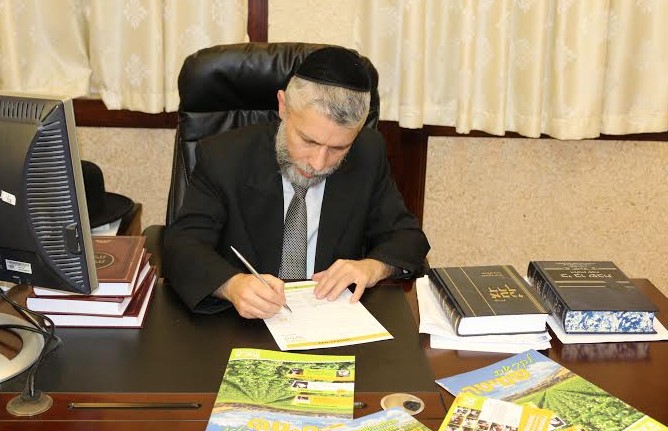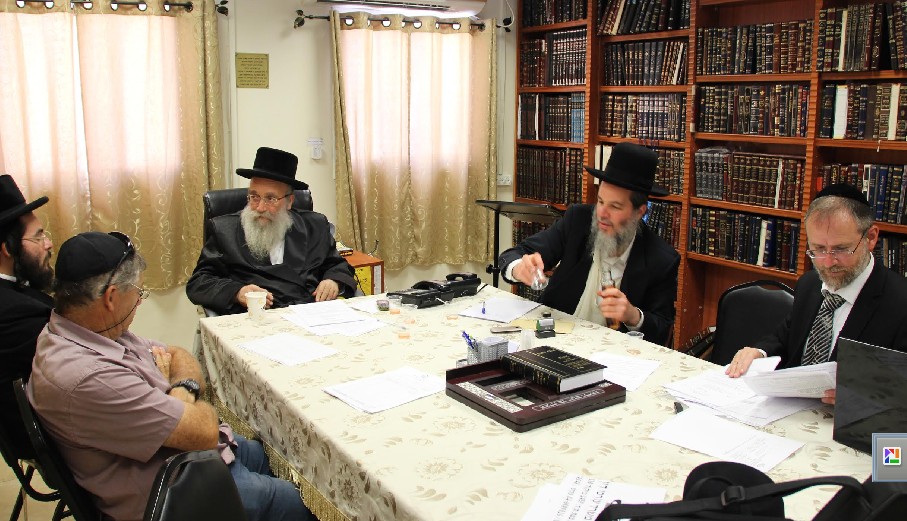New Initiative: Land Sabbatical - Even If You Don't Own Land
Bringing Shemitah observance to the masses: Two rabbinical scholars purchased large agricultural plots and divided them into affordable parcels, allowing everyday people to fulfill the biblical commandment of land sabbatical

When Simcha Margaliot and Mordechai Tirhoyz, two scholars from the 'Sadigura' kollel in Jerusalem, began studying the laws of Shemitah (sabbatical year), they never imagined it would grow into a groundbreaking project enabling ordinary people to fulfill the commandment of Shemitah 'by the book.' The trigger for this initiative came during their studies when they realized that sadly, almost no ordinary people today have the opportunity to let their land rest. After all, to observe the Shemitah properly, one must first own land.
With this concept in its infancy, the two approached the Sadigura Rebbe for guidance. First, they wanted to confirm their theory that few people today can fulfill this commandment as written, which the Rebbe affirmed. They then sought his blessing for the path ahead, which he granted.
From conception to implementation was a long journey. Eventually, by Heaven's grace, they found a suitable plot of land that had not yet been utilized for agriculture, spanning huge areas of the country. Over time, two more partners joined the Shemitah project: David Weinberg and Avraham Dikman.
 Fulfilling the commandment by the book. The project initiators
Fulfilling the commandment by the book. The project initiatorsEight years later, it's amazing to see the significant impact this local initiative by two kollel scholars has created: what began as serious study of Shemitah laws quickly evolved into a 'Shemitah Organization,' established to help the public properly observe the sabbatical year commandments, and has already received blessings from leading Torah authorities.
"I thought they were trying to pull a fast one on innocent people"
"I decided to join the Shemitah Organization seven years ago," recalls Dikman. "As a real estate broker inclined to be skeptical about such projects, I initially thought this was someone trying to run a scheme at the expense of honest, innocent people."
However, after extensive investigation, Dikman was surprised to discover that, contrary to his expectations, the results aligned with both halachic and legal requirements. "Not only did I decide to join the project, but I went a step further - I gathered my children and told them we were going to buy land to fulfill the Shemitah commandment. To this day, that page is preserved in one of Simcha Margaliot's binders. 'Do you remember this?' he asked me recently while waving the page bearing my son's childish signature, as happy as if he possessed a great treasure," Dikman describes with a broad smile.
 Rabbi Zamir Cohen. Supports the innovative project
Rabbi Zamir Cohen. Supports the innovative projectSubsequently, like any good and faithful Jew wanting blessings for his endeavors, our four friends sought the blessing of Rabbi Shmuel Eliezer Stern, a halachic authority and judge in Rabbi Wosner's court. The rabbi approved and blessed them, but the process continued for several more months. Finally, the project's outline was drawn - purchasing a large tract of land to be divided into plots. Each plot would be sold at a symbolic price to make them accessible to ordinary people. Investors were found, land was available - what next? Sounds simple to dive in, right?
Well, numerous halachic difficulties began to surface at this point. Gradually, the full picture became clear: everything needed to comply with state laws, the land had to be registered in the Land Registry, and each plot needed to be marked and numbered. "The investment in the project exceeds one million shekels, though the cost of the land itself is the lesser component," explains Dikman. "Agricultural land can be purchased for as little as 100,000 shekels. However, when delving deeper, it turns out that 97% of all land in Israel actually belongs to the Israel Land Administration rather than private individuals."
What's the problem with that?
"Halacha stipulates that leasing still doesn't confer ownership rights, and someone who buys state lands is essentially just leasing them. Therefore, we had to make numerous journeys to track down land that both suited our needs and met halachic requirements. How did we overcome this challenge? It wasn't simple. In fact, it was quite an arduous journey requiring tens of thousands of shekels in mapping and surveying to prepare suitable land when it was finally found."
What does it mean that any ordinary person can observe Shemitah properly through you? Are women included in this statement as well?
Dikman's smile widens. "Of course women can participate in the mitzvah. Currently, the Shemitah Organization offers three main options for purchase - a plot of one amah (cubit), a plot of four amot, and a plot of four by four amot for those who want to enhance the mitzvah. In the years preceding the Shemitah year, we prepare the land for the buyer - planting crops, watering, pruning, and handling all necessary care. During the Shemitah year, the gates to these lands are opened and the fruits are declared ownerless. The buyer, for their part, must sign an agreement that essentially appoints us to purchase their land unit from them at the end of the Shemitah year."
 Preparing for the Shemitah year
Preparing for the Shemitah yearSo the investment returns to you anyway. So what's the point? Why not slightly increase the plot price and leave it in the buyer's possession?
"Excellent question. Initially, you're right that it would be much easier to leave the land with the owners. But in-depth consultation with Torah authorities shed new light on the matter and helped us understand the halachic problems involved. Let me explain: Let's say this year I can be confident the buyer will observe the Shemitah laws, but what about in seven years? Can an ordinary person, lacking knowledge and resources, commit to diligently maintaining the plot for those seven years? Let's say they can. What will happen in 14, 21, or 28 years? Since it's impossible to commit to this, we risk causing Jews to neglect this commandment. Therefore, under the guidance of leading rabbis, it was decided that the buyer would allow us to sell the land to a third party after the Shemitah year."
Let's talk about prices. Is the commandment financially accessible to the general public?
"Indeed it is. That was the whole purpose - to lower prices as much as possible to allow ordinary people to merit this mitzvah. Just to give you an idea: The price we ask for a plot of one amah is 600 shekels, divided into 50 shekels per month for a year. For four amot, the price is 1,200 shekels, and for the enhanced plot of four by four amot, the price is 3,600 shekels, divided into 300 shekels per month.
"So far, we've received very warm responses to this initiative, including recommendations and blessings from leading rabbis - both Ashkenazi and Sephardic. The people who purchase our plots come from all communities and backgrounds, from Israel and abroad. You can clearly see that the collective characteristic connecting them all is their love for mitzvot. It moves us every time anew to see how nothing stands in the way of those who wish to bring satisfaction to the Creator of the world."

